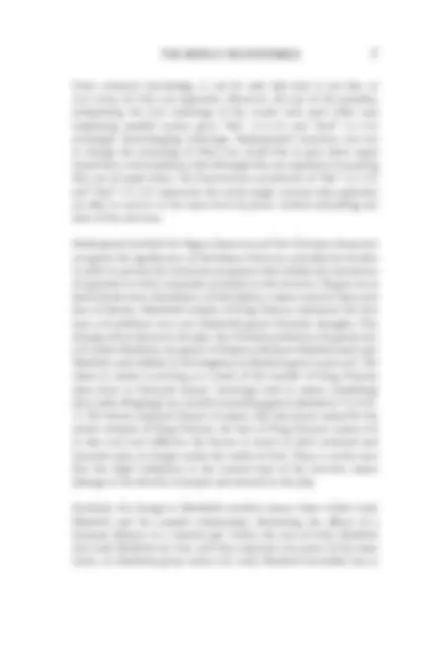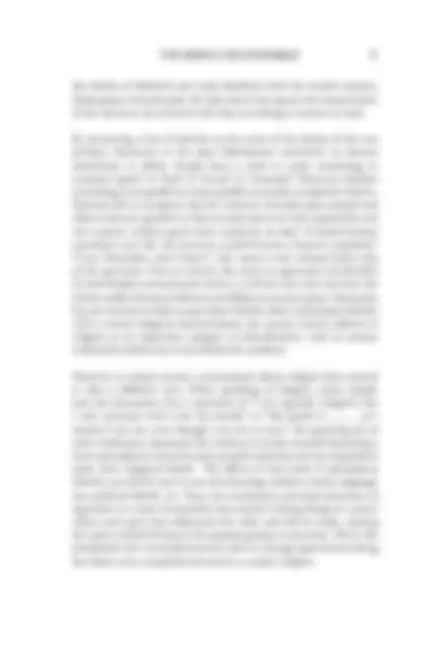





Study with the several resources on Docsity

Earn points by helping other students or get them with a premium plan


Prepare for your exams
Study with the several resources on Docsity

Earn points to download
Earn points by helping other students or get them with a premium plan
Community
Ask the community for help and clear up your study doubts
Discover the best universities in your country according to Docsity users
Free resources
Download our free guides on studying techniques, anxiety management strategies, and thesis advice from Docsity tutors
This document delves into the concept of neutrality in the universe, as portrayed in Shakespeare's Macbeth. how the play emphasizes the importance of balance between opposing forces, drawing on Christian doctrine, the laws of physics, and European history. The document also explores the relationship between Macbeth and Lady Macbeth as a representation of this theme.
What you will learn
Typology: Study Guides, Projects, Research
1 / 6

This page cannot be seen from the preview
Don't miss anything!




Sir Isaac Newton’s Third Law of Motion states that every action causes a simultaneous force with an equal and opposite reaction. This statement forms the foundation for the belief that the universe naturally maintains a state of neutrality. The tendency for the universe to maintain a steady state in all aspects of its existence can be applied to “good and evil, life and death” (“Law, Neutrality, and Chaos”). The fundamental concept that “if one factor becomes ascendant over its opposite, the universe becomes unbalanced” (“Law, Neutrality, and Chaos”) is an elemental theme in the plot of Macbeth. By repeatedly showing opposing forces forming partnerships, Shakespeare communicates that the universe attempts to remain in everlasting neutrality and that disturbance to the natural balance causes chaos and/or evil to ensue. The importance of the balance between opposing forces to maintain neutrality in all aspects of nature cannot be overstated, for it is the foundation of life. Macbeth was written during the Renaissance, when Christian people were united in fundamental beliefs about God. God was seen as the ultimate embodiment of natural balance, for “He made man—male and female—in His own image” (Renaissance Church), representing duality. God’s manifestation of the supreme balance communicates the acceptance in a Christian society that all events and bodies are brought together to create an equilibrium of forces. In addition to the laws of physics and basic Christian doctrine, the history of Europe also provides context for Shakespeare’s Macbeth. In the view of Christianity popular—and indeed formalized as a sacrament in the Church—in the Middle Ages, married couples are joined under the eyes of God, with the requirement of His blessing, via a priest. In Renaissance society, where Christian religion played a principle role in determining life goals and morals, this marital blessing by God held great importance. Thus, by having Macbeth and Lady Macbeth, who This paper was written for Megan Downey’s sophomore English class in the spring of 2014.
constantly represent two halves of a whole, be a married Christian couple, Shakespeare reaffirms the heavenly acceptance of opposites having a natural attraction that maintains their net neutral state. The early development of the yin-yang nature of Macbeth and Lady Macbeth’s relationship brings the significance of neutrality to the forefront. In Act I of Macbeth, Lady Macbeth represents selfishness and ambition. When Lady Macbeth first hears of the Weird Sisters’ prophecy that Macbeth will be King, she “fear[s] [Macbeth’s] nature” (1.5.16) because she believes “[his nature] is too full o’ th’ milk of human kindness” (1.5.16) for him to take the initiative to make the prophecy come true. The prospect of having more power as queen drives Lady Macbeth to manipulate Macbeth by insulting his masculinity and saying “[he] is a man” (1.7.47) only “When [he] durst [kill Duncan]” (1.7.46). Lady Macbeth does not care about Macbeth’s afterlife, the well-being of Duncan, Duncan’s sons, or the entire kingdom; she is preoccupied by her own selfish motivations to gain power and will not let obstacles caused by Macbeth’s personality stand in her way. The basis of Christianity lies in selflessness and concern for the welfare of the community. Contrary to her culture, Lady Macbeth’s intentions are the human manifestation of anti-Christian thoughts and beliefs. In comparison, in Act 1 Scene 2, Macbeth feels fulfilled in his service, fighting “brave[ly]” (1.2.16) and “fac[ing] the slave” (1.2.20) in the name of the King. In Macbeth’s society, the King was God’s representative. Thus, Macbeth is essentially content in his service towards God; he consistently manifests completely Christian beliefs. Shakespeare uses Lady Macbeth’s acknowledgement of the apparent righteousness that Macbeth’s being exhibits, and the expression of her true intentions to manipulate Macbeth to forcefully take the throne, in order to further emphasize the two characters’ fundamentally opposite natures. By having the anti-Christian wed to the Christian under the eyes and blessing of God, Lady Macbeth and Macbeth’s pair is fate—it maintains the neutral quality of the universe as their opposing characteristics cancel each other out. The Pagan faith in the vital balance between entities is presented by Shakespeare’s use of the paradox “fair is foul, and foul is fair” (1.1.11). 6 Kamakshi Bhargava
proportionally turn less evil even if it is against her will, for the universe has to maintain its balance. Thus, as Macbeth slowly turns more evil and ambitious due to influence from his wife, Lady Macbeth can feel the amount of evil she embodies decreasing. As Lady Macbeth’s “good” conscience grows within her, she is unable to physically handle the cognitive dissonance. Lady Macbeth is naturally evil, and the good that is pouring into her due to the workings of the universe causes her to lose her identity. She starts to hallucinate in her sleep, with innocent thoughts filtering through her dreams, and any remaining evil thoughts taking form during the day when she could consciously try to control her thoughts. Her guilt surfaces through her dreams as her innocent subconscious vigorously attempts to rid her of the sin and “damned spot[s]” (5.2.25) of blood from the murders she has committed, as she sleepwalks. However, her naturally selfish and sly personality continues to shine through as she states “what need we fear who knows it, when none can call our power to account” (5.2.27.28), proving that her justification for her murders has a standing impression on her thoughts. But her inability to deal with the dynamic balance between herself and Macbeth causes her cognitive dissonance to reach a breaking point: she has to commit suicide to escape from the traps of guilt and ambition. Lady Macbeth’s loss of identity parallels Macbeth’s loss of religious faith, which signifies the collateral effect of an imbalance between parts of a whole. In Act 1, Macbeth is seen to be content with living his life “brave[ly]” (1.2.16) fighting to support the King (and indirectly God), “with his brandished steel…fac[ing] the[enemy]…unseam[ing] him from the nave to the chops” (1.2.17-22). However, after the death of his wife, he refers to life as “but a walking shadow…a tale/told by an idiot…signifying nothing” (5.5.23-28), showing his thoughts shifting towards belief that life is ultimately empty and without purpose. Macbeth no longer has a religion, nor anything larger to live for, and has thereby lost his moral direction in life. Just as Lady Macbeth could not exist with morals, Macbeth has lost his identity and purpose without his religion. Neither husband nor wife can cope with the alteration of their identities. The situation ends in chaos for the whole society once neutrality is disturbed by their feelings and actions. With 8 Kamakshi Bhargava
the deaths of Macbeth and Lady Macbeth, both for similar reasons, Shakespeare demonstrates the idea that if one upsets the natural order of the universe, the universe will stop at nothing to correct its state. By portraying a loss of identity as the cause of the deaths of the two primary characters in the play, Shakespeare comments on human attachment to labels. People have a need to mark something or someone “good” or “bad” or “moral” or “immoral.” However, whether something is acceptable or unacceptable is actually completely relative. Humans fail to recognize that the universe naturally pairs people and objects that are opposite so that one side does not exert superiority and win control: without good there would be no bad; “if death became ascendant over life, the universe would become a barren wasteland” (“Law, Neutrality, and Chaos”). Life cannot exist without both ends of the spectrum. Even as society has come to appreciate the benefits of individuality and personal choice, it still has not come far from the initial conflict between followers of different moral systems. Humanity has not evolved to fully accept others’ beliefs. Most individuals identify with a certain religious denomination; our society strictly adheres to religion as an important category of identification. And no person voluntarily forfeits his or her beliefs for another’s. However, in today’s society, conversations about religion have started to take a different turn. When speaking of religion, many people turn the discussion into a statement of “I am (specific religion), but I only associate with it for the morals” or “My family is _____ so I assume I am too, even though I am not so sure.” The growing use of such confessions represents the world as it inches towards becoming a more amorphous society because people’s identities are less dependent upon their religious beliefs. The effects of this trend of amorphous identity can also be seen in use of technology, fashion trends, language use, political beliefs, etc. Thus, the continuous universal attraction of opposites to a state of neutrality has started to bring things to a point where each party has influenced the other and left its mark, causing the stark contrast between the separate groups to decrease. This is the justification for social phenomena such as younger generations being less likely to be completely devoted to a certain religion.